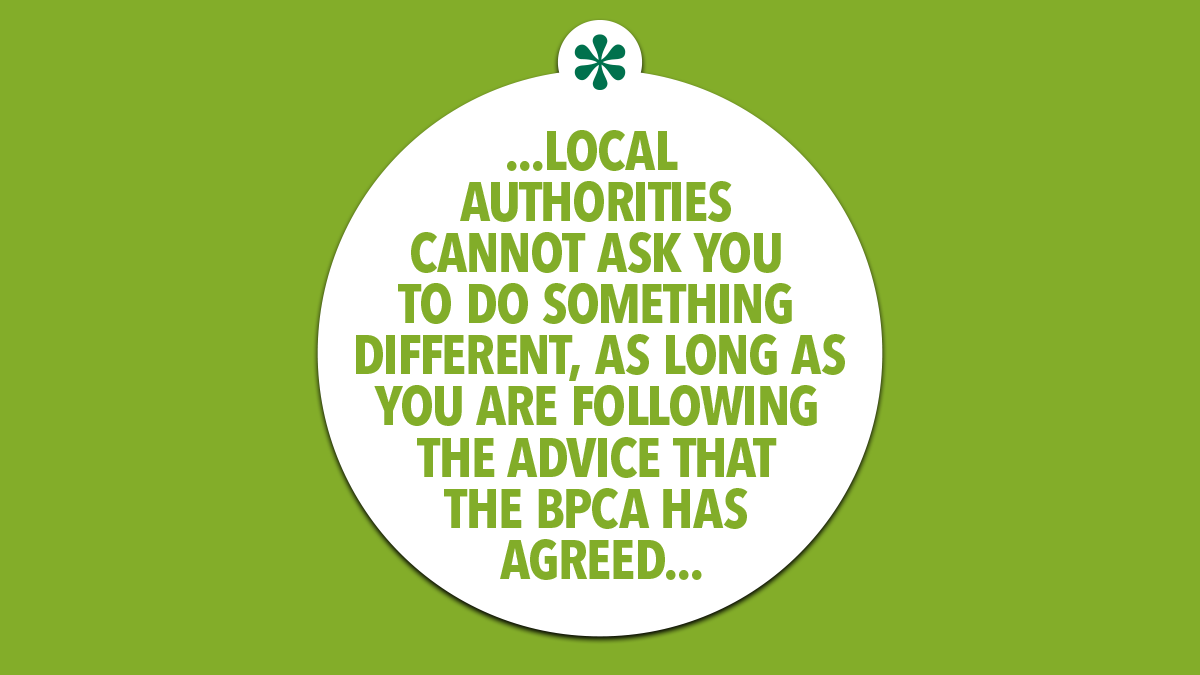Your association | PPC95 May 2019
BPCA now has a Primary Authority! I bet you’re wondering what this is, why we’d want one, and what it means for members? BPCA Technical Manager, Dee Ward-Thompson, explains the new partnership and how it’ll open doors for the Association and its members.
SPEED READ:
- An organisation forms a legally-recognised partnership with one local authority – its Primary Authority
- They can provide the business with regulatory advice which other local authorities take into account in their dealings with that organisation
- If you are following the advice that the BPCA has agreed with its Primary Authority, other local authorities cannot ask you to do something different
- We’re starting with Code of Conduct and exploring a contract template, but the partnership could open many doors for BPCA members.
Many trade associations have a Primary Authority. At first, I must admit it took me a while to understand if and how it could benefit BPCA and our members. What is the point of a Primary Authority?
Truth be told, I didn’t know until a few months ago and have been investigating what it is and what it could mean for us ever since. Like understanding a tricky pest issue I needed to break it down into the key components.
What is a Primary Authority?
An organisation to form a legally-recognised partnership with one local authority. This is called its Primary Authority.
The Primary Authority can provide the business with regulatory advice which other local authorities take into account in their dealings with that organisation. Primary Authority is a means for businesses to receive assured and tailored advice on tricky issues like:
- Working with environmental health
- Trading standards
- Health and safety regulations.
A Primary Authority will let BPCA do this through a single point of contact.
A business can form its own partnership with a local authority thereby choosing its own Primary Authority. It will then receive Primary Authority advice tailored to its specific needs from its Primary Authority. Alternatively, a business can belong to a trade association with a Primary Authority. This way, each member can benefit from a coordinated Primary Authority.
In this case, the Primary Authority advice is still from the Primary Authority, but this is provided via the trade association, and tailored to the general needs of its members.
In short, this means BPCA will be able to provide regulatory advice and guidance to members assured by a local authority.

What will change?
After understanding what a Primary Authority can do, we now need to understand what benefits we’ll actually get from the partnership.
We’re starting with the BPCA Code of Conduct and then later on we’ll be working with our Primary Authority to get the Codes of Best Practice and Guidance Documents assured.
The headline here is that other local authorities cannot ask you to do something different, as long as you are following the advice that the BPCA has agreed with its Primary Authority.
If another local authority has a question about the advice or a different interpretation of the law, you will be able to ask them to contact me (BPCA) and I will liaise with our Primary Authority to resolve the matter. This means that you can carry on running your business knowing that you are protected from the consequences of inconsistent local interpretation of regulations.
Still confused? Here’s a practical example...
One of your clients has an Environmental Health Practitioner, insisting on a certain pest control measure being taken that you don’t agree with. As long as you have followed the assured advice (BPCA Codes of Best Practice and Guidance Documents) we would be able to liaise with our Primary Authority on your behalf.
As long as you follow BPCA codes, BPCA members have always had the full support of BPCA. But soon, with this new partnership, you’ll also have the backing of our Primary Authority - albeit via BPCA.
Next steps
We’ve had our first scoping meeting. This involved looking at our processes and procedures, and then discussing what would benefit the Association and members the most.
Now we’re going to roll up our sleeves and work closely with the environmental health team to get our Codes of Best Practice ready to be assured. We’ve also set time aside with the trading standards team to see if it’s possible to create contract templates.
Over the coming months, we will be working with our Primary Authority to write and publish assured documentation. We’ll also release a process that you will be able to follow should you have dealings with a local authority and need help and support in getting an issue resolved.
It is early days in this exciting partnership and as the saying goes, “Rome wasn’t built in a day”, but I hope you’re excited to see how this partnership develops and what benefits it can bring every member of the association.
Our partner: Milton Keynes Council
We knew that BPCA having its own Primary Authority would be a great benefit to the Association and our members, but it was equally important to choose the right partner.
We needed an organisation that understood our industry and had the right skills and experience to work with us. We knew that we wanted an authority close to us as this would make building a relationship easier.
After a few meetings with different councils, we decided that Milton Keynes Council would be the best fit for us.
Getting the right authority was an important part of the process, Milton Keynes is local and has the right experience and skills to suit our industry.
GOT A QUESTION?
Do you have a query about Primary Authority that’s not answered here?
hello@bpca.org.uk
Source: PPC95